Every homeowner desires to have their kitchen smell nice. This is mainly so because that’s where we prepare our food.
However, a study on the dirtiest spots in the house shows that our kitchens get exposed to more bacteria and germs than all the other parts of our house. They get messy and gross so fast because of the many cooking activities that happen in a day.
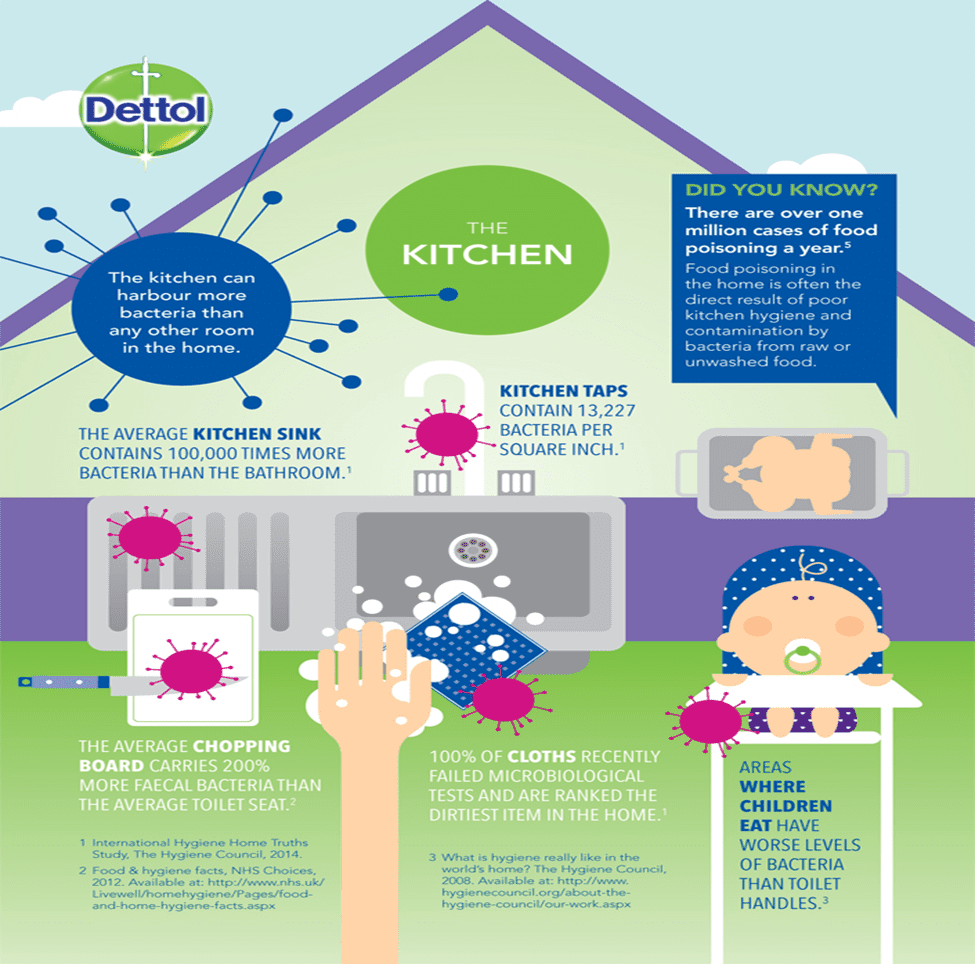
Source: femalefirst.com
Consequently, there’s a need to do a thorough cleaning every day.
Unfortunately, even after a thorough cleaning, we sometimes get a foul smell from our stinky sink. If you try cleaning and the smell fails to go, it could signal a bigger problem.
Here are the possible causes of such kitchen stinky sink smell, plus ways of dealing with it.
JUMP TO: Causes of Sink Smell | How to Get Rid Of Smell | When a Professional Should be Called |
Key Take Away
Your kitchen sink will smell if:
- You have not used it for some time
- The water you use has too many sulfates
- When plumbers make an error in their work
- If grease and oil have coagulated inside the drainage pipe
- If the plumbing vent clogged
- Accumulation of too many bacteria in the drainage pipe
- Accumulation of food debris in the drainage pipe
3 Smell Issues that May Come from Your Sink
The sink Has a bad Odor, and the water isn’t draining
The main cause of these two issues could be a blockage. When food particles accumulate within the drainpipe, it produces a foul smell.
The sink Smells Like Rotten Food.
Other times, your sink will produce the smell of rotten food. Mostly, this smell comes about due to the accumulation of fats, grease, and oils in the pipework.
Sink Smells Like Rotten Eggs
The smell of rotten eggs is awful and irritating. When the U-bend has an issue in allowing sewer gases to escape, you are likely to experience this smell.
Smelling Sink – What are the Causes?
A smelling sink brings such an unpleasant feeling.
But have you ever wondered why kitchen sinks smell?
Fortunately, the smell is usually due to minor issues you can quickly fix.
Here are a few of those causes:
Unused Drain
Have you gone for a vacation of several days, come back, and discovered your kitchen sink is smelling?
No use of the kitchen sink for a while may result in a foul smell.
Every stinky sink drain line has garbage disposal inside that contains some water. Its function is to trap or block sewer smell so that it doesn’t get into your kitchen via the sink.
When you don’t use your sink for a while, the water in the sink drain dries. Consequently, the nasty sewer smell gets its way through into your kitchen.
But worry not!
The remedy for this is simple. Run hot water down the rain, and you will eliminate the smell.
Sulfates
Does your sink produce the smell of rotten eggs?
Most probably, your water has too many sulfates. According Minnesota Department of Health USA, excess sulfates in your water can be a cause of drainage systems.
Among the issues associated with excess sulfates include:
- clogging of the drainage system
- the smell of the sulfate itself
- damage to clothing
- digestive issues when ingested
Plumbing Errors
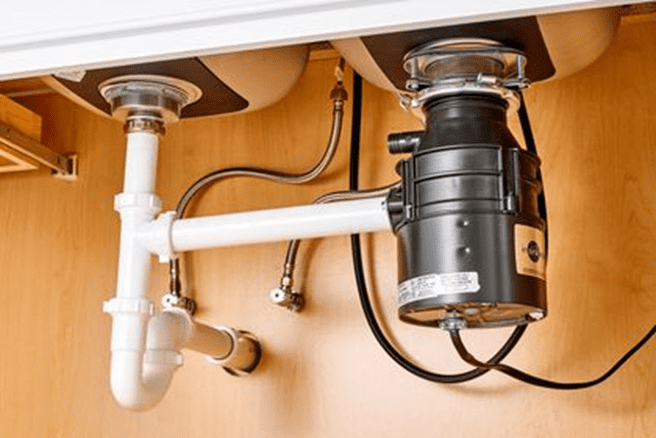
Source: thespruce.com
Unfortunately, you may sometimes discover your sink has a foul smell immediately after completing the plumbing work.
Such smell signals that the plumbers made an error in their work, which can be devastating.
Plumbing errors can lead to leaking pipes or some missing components in the draining system.
So, what is the best thing to do?
Call your plumber immediately so they can come and rectify the issue.
Greasy Drain
Most homeowners have this common practice of dumping grease (and oil) into the drains.
Do you know that this practice can cause serious harm to your kitchen sink?
Grease and oil coagulate inside the drainage pipe and then begin to compose gradually. Eventually, it emits a foul smell, which finds its way to your kitchen.
Moreover, grease and oil can block your drainage pipe with time, forcing you to do major repairs.
Clogged Sewer Vent
The major function of the plumbing vent is to allow fresh air inside your drains. Consequently, this allows water to run smoothly through the sink drain pipe.
However, fresh air gets blocked, and foul gases get trapped in the pipe if the vent gets clogged. As a result, sewer gas begins to get into your kitchen.
Additionally, blockage of the sewer vent causes drainage problems.
Bacteria Growth
You have checked your kitchen drainage keenly, and there’s no leakage.
What then could be the issue?
One of the possible causes of the odor could be bacteria.
Although bacteria are part of your plumbing system, the accumulation of too many of them will cause bad odors.
As food particles and other wastes pass through your sink pipe, there’s a possibility of the accumulation of bacteria. When this accumulates, especially if there’s a clog, it’s bound to produce a foul smell.
Mold and Mildew
Sometimes homeowners quickly look for other causes of odor in the kitchen sink.
However, most need to remember to look out for that one thing; a possible leak.
Any leak on your drainage pipe can soak the wood, and any other material around that can cause molds and mildew. Consequently, it’s prudent to always look out for leaks if you hear any foul smell.
Food Debris in the Pipes
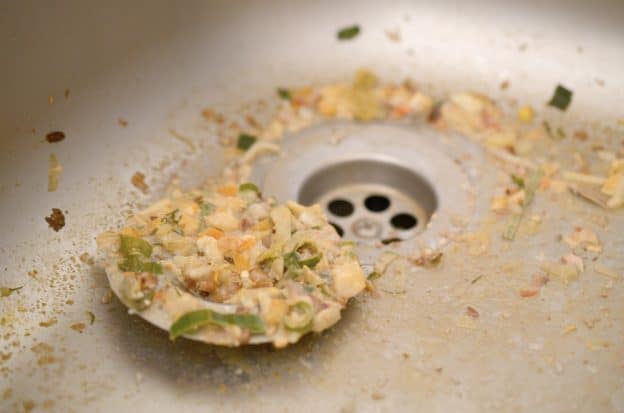
Source: aus-test.com.au
Another common practice with many homeowners is eliminating food particles through sink pipes. The accumulation of organic fats, oil, and other vegetable wastes can cause thick sludge in the sink pipe that can block the drainage system and can emit awful smells.
However, remember that food debris can get stuck and block the drain pipes causing a foul smell.
Related Read: 14 Kitchen Sink Strainer Types Explained
How To Stop Your Sink from Smelling
Below is a list of methods to eliminate nasty kitchen sink drain odors.
Try one DIY or chemical cleaning method for rotting food smells. For sewer gas smells, follow the instructions for checking your U-bend.
DIY Drain Cleaning Methods
Boiling Water
If the state of your sink isn’t so dire, all you may need is water and dish soap.
These simple steps are all you need for this procedure.
- Fill your sink with boiling water, then add some dish soap.
- Agitate the mixture until the water is entirely soapy and bubbly.
- Open the sink drain so that the soapy mixture can go through it.
- Allow for a 5 minutes break.
- Run the cold tap, which forces any remaining grease to flush out
Important Note: If the smell of your sink is mild or your sink is new, this procedure is all you need to get rid of the smell.
White Vinegar
One of the many uses of white vinegar in the kitchen is cleaning out a smelly sink.
Follow these three steps:
- Measure a cupful of vinegar and pour it down the plughole
- Allow it to rest for 30 minutes
- Rinse your sink with hot water
Baking Soda and Vinegar
A mixture of baking soda and vinegar is among the most effective ways to deal with smelly sink drains.
- Pour baking soda (half a cup) into the plughole
- Add some vinegar into the sink drain hole.
- Allow the mixture to react, forming a soapy solution, for around two hours.
- Pour boiling water into the sink drain hole and flush the mixture
Tip: According to some homeowners, you need to do this baking soda and vinegar method every three months to ensure your sink remains clean.
Check the U-bend
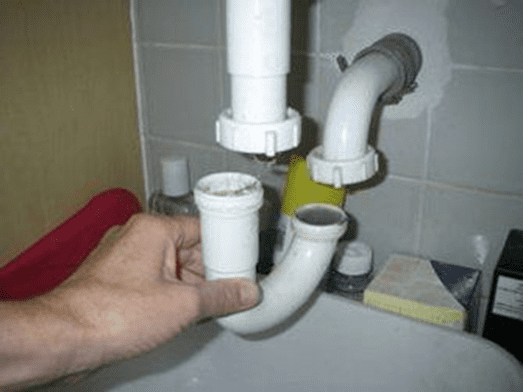
Source: pinterest.com
A rotten-egg smell in your sink mostly comes from the U-bend. The U-bend contains water whose function bars any sewer gases from reaching your kitchen.
The absence of this water in the U-bend means that sewer gases are free to get to your kitchen.
Check the following in the U-bend:
U-Bend Leak
Check underneath the U-bend for any leaks. Any leakage will drain the water, causing sewer gas to reach your kitchen.
The two leading causes of leaks are either cross-threaded or poorly tightened connections.
Unscrew the connections, then tighten them back. If you do it right, this should solve the problem. In case the leaking persists, consider purchasing some parts.
U-Bend Blockage
The cause of the smell could be a blockage in the U-bend.
Remove the U-bend, take it apart and look inside for such blockage. Use a wire to pull out any blockage.
Evaporated Water in the U-bend
This situation mostly happens if you haven’t used your sink for a while. The solution is simple, run the tap so that water can fill the U-bend.
Ice, Lemon Peels, and Salt
This method is ideal if water and soap fail to help eliminate the smell.
Turn off your garbage disposal the put some coarse salt and ice cubes down your sink drain. Turn on your garbage disposal, allow the salt and ice to be processed for a short while, then add some lemon peels.
The lemon peels eliminate odor in the sink, while the ice and salt eliminate the physical residue.
Also Read: What Are Kitchen Sinks Made Of? [13 Types Included]
Chemical Cleaning Methods
Bio-enzyme Drain Cleaner
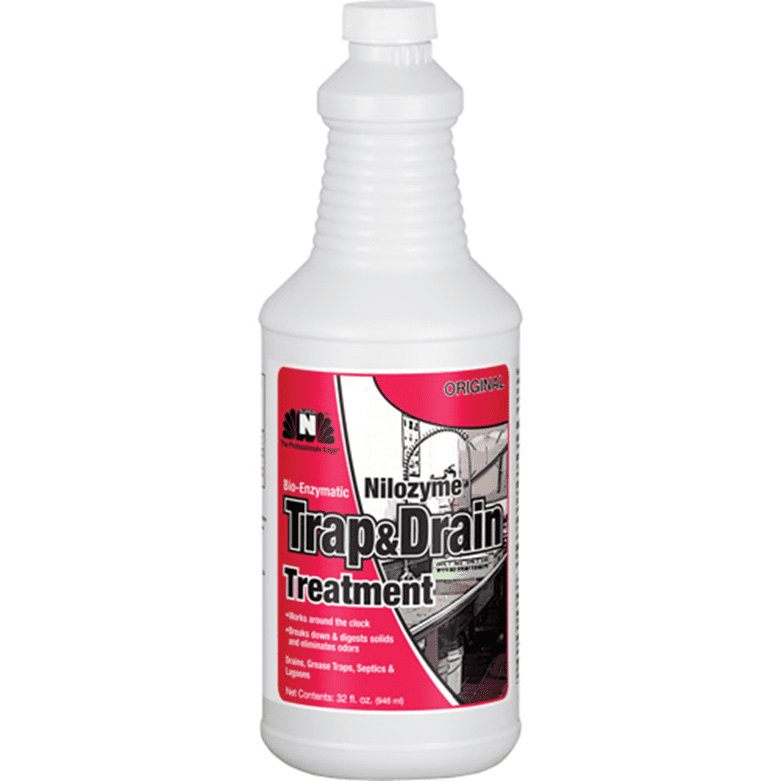
Source: tenaquip.com
Bio-enzyme cleaner is a non-toxic and eco-friendly cleaner. It has enzymes that eat up any food debris in your sink without damaging the pipes.
Ready-made Drain Cleaner
You can get a Ready-made Drain Cleaner from your local supermarket or hardware store. These are commercially prepared cleaning agents that contain chemicals.
They are effective in dealing with the smell and any stuck food particles that remain in your sink.
Caution: Most of these chemicals are dangerous, and you should have your goggles and rubber gloves when using them. Moreover, ensure you follow the manufacturer’s instructions.
When Should I Call a Professional?
Have you tried removing the kitchen sink smell in your sink without success?
It could be your time to seek the services of a professional cleaner. Moreover, calling your plumber could be prudent if you suspect that your water has too much sulfate.
Professional plumbers have different tools to help them sort out such issues. Coupled with their experience, they can easily restore your sink and leave your kitchen smelling nice again.

![Wood Cutting Board Vs. Plastic Board [Which is Safer?] Wood Cutting Board Vs. Plastic Board [Which is Safer?]](https://houseadorable.com/wp-content/uploads/2023/01/wood-board.jpg)
![How to Season A Cutting Board? [Simple Steps Explained] How to Season A Cutting Board? [Simple Steps Explained]](https://houseadorable.com/wp-content/uploads/2022/12/cutting.jpeg)
![Granite Vs. Marble Vs. Quartz Countertops [12 Differences+Pros & Cons] Granite Vs. Marble Vs. Quartz Countertops [12 Differences+Pros & Cons]](https://houseadorable.com/wp-content/uploads/2022/03/quartz-marble.jpg)
![How Long Does it Take to Install Kitchen Cabinets? [Steps Explained] How Long Does it Take to Install Kitchen Cabinets? [Steps Explained]](https://houseadorable.com/wp-content/uploads/2022/07/kitchen-cabinet-installation.jpg)
![Is Bamboo Wood Good for Cutting Boards?[8 Reasons Explained] Is Bamboo Wood Good for Cutting Boards?[8 Reasons Explained]](https://houseadorable.com/wp-content/uploads/2023/01/316002766_5887666997938019_9068589372518329358_n.jpg)
![MDF vs. Plywood Cabinets: Which is Best? [8 Key Differences] MDF vs. Plywood Cabinets: Which is Best? [8 Key Differences]](https://houseadorable.com/wp-content/uploads/2022/07/mdf.jpg)
![Is Mold on Cutting Board Dangerous? [Explained in Detail] Is Mold on Cutting Board Dangerous? [Explained in Detail]](https://houseadorable.com/wp-content/uploads/2023/01/image.jpg)